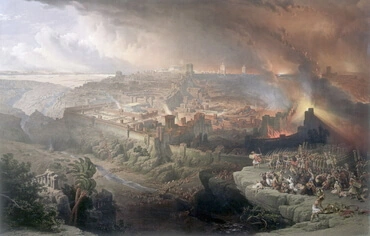1
ESTAS son las generaciones de los hijos de Noé: Sem, Châm y Japhet, á los cuales nacieron hijos después del diluvio.
2
Los hijos de Japhet: Gomer, y Magog, y Madai, y Javán, y Tubal, y Meshech, y Tiras.
3
Y los hijos de Gomer: Ashkenaz, y Riphat, y Togorma.
4
Y los hijos de Javán: Elisa, y Tarsis, Kittim, y Dodanim.
5
Por éstos fueron repartidas las islas de las gentes en sus tierras, cada cual según su lengua, conforme á sus familias en sus naciones.
6
Los hijos de Châm: Cush, y Mizraim, y Phut, y Canaán.
7
Y los hijos de Cush: Seba, Havila, y Sabta, y Raama, y Sabtecha. Y los hijos de Raama: Sheba y Dedán.
8
Y Cush engendró á Nimrod, éste comenzó á ser poderoso en la tierra.
9
Este fué vigoroso cazador delante de Jehová; por lo cual se dice: Así como Nimrod, vigoroso cazador delante de Jehová.
10
Y fué la cabecera de su reino Babel, y Erech, y Accad, y Calneh, en la tierra de Shinar.
11
De aquesta tierra salió Assur, y edificó á Nínive, y á Rehoboth, y á Calah,
12
Y á Ressen entre Nínive y Calah; la cual es ciudad grande.
13
Y Mizraim engendró á Ludim, y á Anamim, y á Lehabim, y á Naphtuhim,
14
Y á Pathrusim, y á Casluim de donde salieron los Filisteos, y á Caphtorim.
15
Y Canaán engendró á Sidón, su primogénito y á Heth,
16
Y al Jebuseo, y al Amorrheo, y al Gergeseo,
17
Y al Heveo, y al Araceo, y al Sineo,
18
Y al Aradio, y al Samareo, y al Amatheo: y después se derramaron las familias de los Cananeos.
19
Y fué el término de los Cananeos desde Sidón, viniendo á Gerar hasta Gaza, hasta entrar en Sodoma y Gomorra, Adma, y Zeboim hasta Lasa.
20
Estos son los hijos de Châm por sus familias, por sus lenguas, en sus tierras, en sus naciones.
21
También le nacieron hijos á Sem, padre de todos los hijos de Heber, y hermano mayor de Japhet.
22
Y los hijos de Sem: Elam, y Assur, y Arphaxad, y Lud, y Aram.
23
Y los hijos de Aram: Uz, y Hul, y Gether, y Mas.
24
Y Arphaxad engendró á Sala, y Sala engendró á Heber.
25
Y á Heber nacieron dos hijos: el nombre de uno fué Peleg, porque en sus días fué repartida la tierra; y el nombre de su hermano, Joctán.
26
Y Joctán engendró á Almodad, y á Sheleph, y Hazarmaveth, y á Jera,
27
Y á Hadoram, y á Uzal, y á Dicla,
28
Y á Obal, y á Abimael, y á Seba,
29
Y á Ophir, y á Havila, y á Jobad: todos estos fueron hijos de Joctán.
30
Y fué su habitación desde Mesa viniendo de Sephar, monte á la parte del oriente.
31
Estos fueron los hijos de Sem por sus familias, por sus lenguas, en sus tierras, en sus naciones.
32
Estas son las familias de Noé por sus descendencias, en sus naciones; y de éstos fueron divididas las gentes en la tierra después del diluvio.







